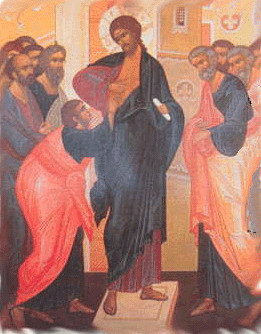From time to time I’ve been musing here about the phenomenon that seems to be more and more common these days: people are giving up on the church.
I sometimes think that people are surprised to know that I understand why so many do. After all, who needs another institution, more  bureaucracy, another set of requirements? Everday life offers plenty of that, as anyone who has recently been to the DMV will know.
bureaucracy, another set of requirements? Everday life offers plenty of that, as anyone who has recently been to the DMV will know.
But when I talk about the church I am not talking about an institution for its own sake. By “church” I mean a “thriving community that bears witness to the reign of God” (thanks for that definition Dr. Jones). At a recent conference I attended the observation was made that vital communities like these are far more often talked about than actually seen, and perhaps this is why so many people throw in the towel.
There are many things I love about being the church here at Calvary, a significant one of which is this urgent longing for a corporate expression of the transforming Gospel. I thought of this fact when I recently read Eugene Peterson’s introduction to the Gospel of Luke, the story of those first Christians and their struggle to be authentic. The very first Christians were the ones faced with the challenge of translating their personal experiences with God into some kind of insitutional expression, which could not have been easy. I often wonder how far we’ve wandered from what they envisioned:
“Most of us, most of the time, feel left out-misfits. We don’t belong. Others seem to be so confident, so sure of themselves, ‘insiders’ who know the ropes, old hands in a club from which we are excluded.
One of the ways we have of responding to this is to form our own club, or join one that will have us. Here is at least one place where we are ‘in’ and the others ‘out.’ The clubs range from informal to formal in gatherings that are variously political, social, cultural, and economic.
But the one thing that they have in common is the principle of exclusion. Identity or worth is achieved by excluding all but the chosen. The terrible price we pay for keeping all those other people out so that we can savor the sweetness of being insiders is a reduction of reality, a shrinkage of life.
Nowhere is this price more terrible than when it is paid in the cause of religion. But religion has a long history of doing just that, of reducing the huge mysteries of God to the respectability of club rules, of shrinking the vast human community to a “membership.” But with God there are no outsiders.” Introduction to Luke, The Message
Thinking about all these things again made me feel grateful to be part of this community stubbornly insistent that there can be . . . there must be . . . an authentic institutional expression of the Gospel message, one that believes God’s radical inclusion and love can be expressed corporately. We don’t always get it right, that’s for sure, but there’s something amazing and wonderful in the trying.















